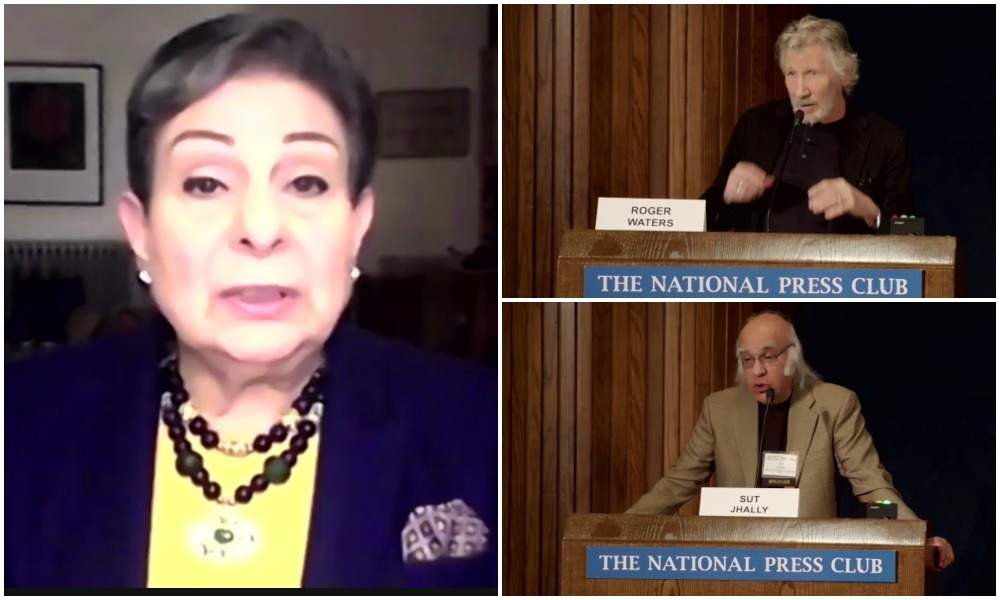CHICAGO: A dozen pro-Palestinian speakers, from Palestinian leader Hanan Ashrawi to Pink Floyd singer and songwriter Roger Waters, told a gathering of activists in Washington D.C. Friday that Israel manipulates news media coverage and hides behind accusations of anti-Semitism to justify its hypocritical policies on Palestine.
The annual conference entitled “Transcending the Israel Lobby at Home and Abroad,” attended virtually by Arab News, scaled the enormous breadth of anti-Palestinian policies not only in Israel but also from America and challenges that exist with the current administration of President Joe Biden.
Ashrawi said a thin line separates the “toxic policies” of Donald Trump and the “indecisiveness” of Biden.
“Settlers are on a rampage everywhere in Palestine. The annexation and expansion of settlements and home demolitions are going on at twice the rate in which they were carried out during in the Trump period. During Biden, the escalation of violations is incredible and is enormous. The extra-judicial executions, daily killings of our people continue with full impunity,” Ashrawi said from her home in Ramallah in Occupied Palestine.
“And Israel, as they say, is taking advantage of the US weakness and indecision. They are very happy that they think of the Biden administration as indecisive, and they are quite happy to live with timid verbal reprimands with no consequences. The rate at which the destruction is taking place and the killings is so accelerated.”
Ashrawi said Biden opposes “settlement expansion” but does not speak out to confront existing “illegal settlements,” a major change from previous administrations. She said the Biden administration allows Israel’s government to “set the policies” for America, including having to “ask” Israel for permission to do things they have the power to do, such as re-opening the consulate in East Jerusalem or re-joining organizations such as UNESCO.
American policy changed dramatically, Ashrawi said, under Secretary of State Hillary Clinton, who declared US policies had to “pivot away from the Middle East” because achieving peace was difficult.
Sut Jhally, professor of communication at the University of Massachusetts Amherst and executive director of the Media Education Foundation, said many of the challenges Palestinian face is the result of a deliberate propaganda campaign by Israel to define Palestinians as terrorists and Israelis as defenders.
Jhally said that until late in the 1980s, the mainstream news media was fair and often criticized and challenged Israeli actions.
“Such coverage is unthinkable today … Journalism in the US doesn’t exist today,” Jhally said. One strategy was to counter justice for Palestinians with threats of terrorism against Israelis. Reverse the reality, he said Israelis were advised, and always start their propaganda with repetitive phrases such as “Hamas rockets” and “Palestinian terrorism,” not with Israeli violence.
Jhally said that in the 1990s, Israelis gathered marketing and media experts to redefine how the conflict was being presented to the public, dubbed “Hasbara,” and strategize on managing news media coverage. “Propaganda is not a dirty word,” Jhally said media experts told Israel. The Hasbara strategists also recommended to “avoid history and avoid facts” in speaking to Americans, Western audiences and media.
Waters, who has organized boycotts of Israel by some of the world’s most famous artists, said he is often attacked as being “anti-Semitic” because he supports human rights for Palestinians.
“I support the fight for human rights of all people everywhere,” Waters said defiantly.
Waters, who has called Israel a “terrorist, apartheid regime,” said there is a positive impact for Palestinians from the artist boycotts on Israel, educating fans about Israel’s apartheid policies and violence.
He said he speaks out in defense of human rights across the world, but said his voice in support of Palestinians “by far draws the most ire.”
“We know what anti-Semitism means and it does not mean criticizing the state of Israel, you a——,” Waters said to cheers. “No conversation about Israel is possible without using the word apartheid. Because Israel is an apartheid nation.”
Speakers addressing the conference included Haaretz columnist Gideon Levy, who said Israelis simply close their eyes to reality, denouncing the occupation and violence in Ukraine while saying nothing about occupation and violence in the occupied West Bank.
Rev. Donald Wagner, former national director of Friends of Sabeel-North America and Middle East studies professor, spent years studying “Christian Zionism” and explained the powerful impact American Christians from the far right have on US policy against the Palestinians. Ironically, the Christian Palestinian population has dropped significantly from 13 percent at the start of the 1967 occupation to under 1 percent, today.
Huwaida Arraf, co-founder of the International Solidarity Movement (ISM) and who is running as a Democratic candidate for Congress in Michigan’s 10th District, said her activism fighting for Palestinian human rights prepares her for fighting for the rights of families in her district.
“Around me, my neighbors, there are human rights violations being committed every day. They are not the same as what I saw in Palestine, for sure,” Arraf said.
“When you have to decide between putting food on the table and heating your home, you are not free … when you have to ration your medication, when you are afraid to go to the hospital because you cannot afford the hospital bill, you are being denied, you are not free.”
She said her focus is “putting people at the center of our policies whether they are foreign or right here.”
Arraf said she expects her critics to avoid the real issues and instead attack her falsely in the campaign as being “anti-Semitic.”
The conference was organized by the Washington Report on Middle East Affairs magazine, based in Washington D.C., and the Institute for Research and Middle East Policy.




